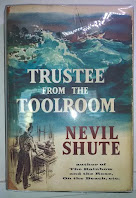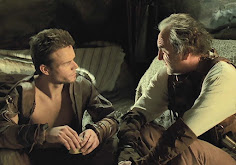REVIEW
I saw the movie the night of October 21st. It was the most opportune time. It
turned out to be a unique experience: the first time in my life I've
seen a movie before its official release date. The theater was full and
the audience attentive--and the movie is nearly 3 hours long!--but then I
suppose fans are already committed. A good reason to go when I did!
Below is my list of what I hoped to see alongside commentary:
*Spoilers*
1. The movie focuses on Paul immediately in the opening scenes and doesn't get bogged down by its own mysticism/mythology.
The movie doesn't begin with Paul. It begins on Arrakis, Chani narrating. My initial reaction was disappointment--except
that in a very brief sequence, the narrator lays out the Atreides
versus Harkonnen struggle. Bang! External conflict instantly
established!
The
movie never loses this focus. The emperor's minions are brought into
the story but never the emperor. I was highly impressed.

After
the brief opening, the movie immediately moves to Caladan. It is
exactly how I always imagined it--if a tad more Scottish (seriously,
there are bagpipes). Settings and dream sequences emphasize Caladan's
abundance of water versus the lack of water on Arrakis. Finally! Someone
gets the point!
2. The movie gives Jessica due credit as a fully rounded character. She is neither diminished nor dropped on a pedestal.

Played
by Rebecca Ferguson, Jessica is an impassioned powerhouse. She is not
as complexly presented as in the book, but I can allow for the
difference.
As mentioned elsewhere,
movies are by the dictates of their medium tethered to the images they
choose to present. The 1984 movie tried to do too much. The
Dune miniseries tried to narrow its focus at odd moments, giving the series a haphazard feel.
Dune (2021) keeps the focus on Paul, where it should be kept. I agree with this choice.
 3. Paul as potential prophet is established early on. He is portrayed as neither a yuppie nor a war leader.
3. Paul as potential prophet is established early on. He is portrayed as neither a yuppie nor a war leader.
Paul is our perspective into the story. Paul being played by Timothee Chalamet makes a difference.
He
is, for one, how I imagine Paul. If he reached adulthood on Caladan, he
would become a friendly, relaxed, thoughtful, charismatic, yet somewhat
removed and enigmatic leader. Send him to Arrakis: he becomes something
else. But the elements are there already.
Early
on in the movie, Paul endures the test of the Gom Jabbar. Thankfully
(since I always thought it was kind of tacky), we don't see his hand
burning. All we see is his face as he reacts to the test. Chalamet may
not yet have Freeman's extraordinary range of subtle facial movements;
he is rapidly getting there.
4. The Harkonnens are intelligent rivals, neither too awful (if memorable) nor too "everybody has a dark side!" token symbols.
I
still don't get how the Harkonnens could be in charge of anything. One
thing these movies fail to realize is that evil men like Stalin had
supporters--among intellectuals and among leaders drawn to a supposed adherence to their own
philosophical wishes.

The Britishers in
Star Wars are at least amusingly dry.
Bad guys in drab cities sitting around bare metal rooms without furniture and then sinking into sludgy, oily baths are kind of...blah.
Frank
Herbert gives the Harkonnens an Ancient Roman Caligula vibe, which is
at least somewhat explanatory (bread & circuses). The movie doesn't.
The
Baron is darkly intelligent. But still, I would think he would have
multiple uprisings and riots on his own planet to worry about--not much
time to deal with Arrakis.
Oh, look, his people would say,
it's a bad guy! He hangs around rooms with no chairs! In justice, the movie isn't about the Harkonnens but about Paul. I have to commend that decision again.
6. The movie is intelligently paced--the last two-thirds of the story has a decent flow.
I likely would have realized the following if I had watched previews and read up on the movie beforehand. I didn't.
The movie is Book 1.
About 1-1/2 hours (I presume) into the movie, I thought, "What is with these Dune scriptwriters? They aren't leaving enough time for the last 2/3rds. It's going to be a mishmash (again)."
Then, about two minutes later, I thought, "You dummy, Kate. It's Book 1."
I was impressed.
It's still a problem.
 6. Complicated Dune politics are explored, or at least referenced, through characters like Liet-Keynes. Other characters are combined.
6. Complicated Dune politics are explored, or at least referenced, through characters like Liet-Keynes. Other characters are combined. Liet is massively underused. The exigencies of the script may have left the writers no choice.
I mention above: only the emperor's minions show up. The emperor doesn't make an appearance in Dune
(2021). Nor does Princess Irulan. They don't need to! The political
problem plays out intelligently without throwing every character in the
book at the screen. I was extremely impressed.
7.
The movie isn't preachy. Not sure how it can be but everything seems to
be these days. So--the Fremen are complex, not irritatingly
self-righteous as The Victims.

The movie isn't preachy. In fact, it adheres closely to the book's notable action sequences. These sequences carry the political/religious context.
The problem is that unlike LOTR--which was, granted, split into 3 books by its publisher, not its author--Book 1 of Dune
doesn't have a natural conclusion/wrap-up. By focusing on Paul (let me
say again: awesome script choice!), the movie was able to end not on an
upbeat note (the book doesn't have many of those) but on Paul's
acceptance of his fate on Arrakis--or at least, on as much of that fate
as he can foresee.
Still,
it's not exactly the same ending as Frodo parting from the Fellowship
or the rescue of Helm's Deep or, even, Bilbo et al. escaping the Misty
Mountains. I'm not saying
Dune (2021) fails. I'm saying...
See below.
I
don't think anyone in the audience was disappointed. I did hear one
young man say to his friend, "The 'original' [his word] was half the
time and covered the whole story." To which, someone in his group
mentioned something about Book 1. I muttered it to myself.
He
wasn't complaining, however! His voice was one of wonderment. As my
theater companion said, "I guess...2022." (The sequel, which will cover Books II and III, might not come out until 2023.) Various
audience members paused outside the theater to exchange thoughts. I
don't know if they all approved of the movie, but nobody was saying,
"Wow, what a waste of my entire Thursday night!"
It is nice to go to an opening night with people who already care.
IN SUM
I
was completely engaged by Dune (2021). The movie is well-worth seeing on a big screen.
The focus on Paul (and through him) is one of the smartest script
choices for a book-to-movie I've experienced.
It is a problematic book to bring to screen.
Here's why:
There is a strong shift in tone at Leto's death. As soon as Paul and Jessica escape into the desert, the story veers in a new direction.
In the book, to a huge extent, the reader is prepared for the shift by the opening chapter blurbs, delivered (mostly) in the voice of Princess Irulan. The fatalistic essence of Paul's life's course is established.
In the 1984 version, this tone is established early on, which I commend. It is not the scriptwriters' fault that Kyle MacLachlan is the least fatalistic-looking person in the universe.
Not exactly Keir Dullea.
The miniseries didn't attempt to establish the fatalistic tone. The writers relied on the break in episodes, which was smart and the best approach overall.
The 2021 movie establishes Paul's unique personality and fate, but the new tone after Leto's death is glaring. The movie should have ended with the escape from the palace, possibly with the descent into the storm.
 But it then would have become the most depressing mystical sci-fi movie since Hal started killing people off out there on a lonely space station.
But it then would have become the most depressing mystical sci-fi movie since Hal started killing people off out there on a lonely space station.
COVID could be to blame here. The sequel is still in pre-production. If the movie had come out as originally scheduled, the sequel may have been more of a certainty. The studio could have afforded a cliffhanger.
As it is, the film editors gave the movie a resolution of sorts.
(I have to wonder, how many fans based on previews, not fans of the book or prior movies, are rushing home this weekend to check out the book/prior movies?)
It is an odd circumstance since in a way the editors/studio had to opt for some kind of resolution as opposed to an aesthetically coherent film. I don't fault them for the choice--but--
It is a difficult book to render on film.
Hmmm, how soon will a director's cut come out?
PRIOR REVIEWS:Dune (1984)
Miniseries, Part 1
Miniseries, Part II
.jpeg) Can the travelogue have a successful narrative arc?
Can the travelogue have a successful narrative arc?.jpg) his approach works with books in part because the individual chapters are rather like graphic novel/manga volumes--the adventure and momentary interactions are the point. Out of the Verne books I've read, 20,000 Leagues Under the Sea grabs me the most (despite the singular inability to explicate Captain Nemo's motivations) because the under-ocean setting is so enthralling. I can imagine that for budding sci-fi readers in the late-1800s, Verne offered something that captured both the steampunk impulse and the exploration impulse.
his approach works with books in part because the individual chapters are rather like graphic novel/manga volumes--the adventure and momentary interactions are the point. Out of the Verne books I've read, 20,000 Leagues Under the Sea grabs me the most (despite the singular inability to explicate Captain Nemo's motivations) because the under-ocean setting is so enthralling. I can imagine that for budding sci-fi readers in the late-1800s, Verne offered something that captured both the steampunk impulse and the exploration impulse.



















































